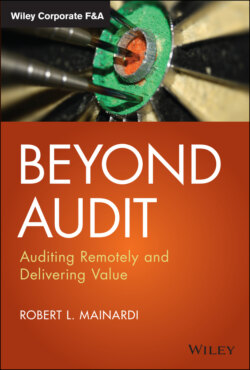Читать книгу Beyond Audit - Robert L. Mainardi - Страница 18
RESPONSIBILITY ASSIGNMENTS
ОглавлениеAnother factor that will contribute to the success of your remote audit will be the assignment of work to be completed in each audit phase. This responsibility is no different in a regular audit, as compared to a remote audit. However, the person responsible for keeping the audit on track should have a heightened awareness of the assigned task, along with the corresponding deadlines for each, as the tasks can get out of control from a delivery standpoint much easier on a remote audit. This is due to the fact that the audit team is usually physically dispersed during the remote audit and task delinquencies can go unnoticed sometimes until it is too late.
To ensure remote assigned tasks keep to their assigned deadlines, the project lead or in-charge has to remain diligent in the tracking and monitoring of the business unit questions, data requests, and audit testing completion. Any delays, missed deadlines, or audit work challenges must be identified proactively and addressed with expediency. Too many times, the audit suffers from a lack of oversight on remote audits because there is a lack of regular and timely communication within the audit team. As previously discussed, remember how critically important it is for the audit team to maintain a high level of communication within the department and during audits to ensure all team members are aware of the deadlines and the urgency to complete assigned tasks on budget.
One caveat must be mentioned when it pertains to assigned budgets. A budget is the documented estimate of time to complete a task, and it is based on either historical data or a projection that was formulated from the testing requirements to be completed. Keep in mind that budget estimates are just a best guess. Although they should be regarded as a guide for how long any audit task or testing should take to complete, budgets can and should be challenged when they appear to be unrealistic. Do not ever rush or force the assigned work just to fit into the budget number. That is a huge mistake. The moment you identify that there is no possible chance that you or any auditor could complete an assigned task under that corresponding budget, say something. Do not try to go faster to make the deadline just for the sake of the deadline. When that happens, whatever work or testing was supposed to be completed will get finished within the budget but will ultimately have exclusions and mistakes, along with a false sense of accomplishment.
One additional tip related to budgets: The moment you are certain there is not sufficient time to adequately complete the assigned task within the budget, reach out to your audit project lead and explain the need for additional time. Make sure you detail the initial budget, data and work required, and the time needed to review and conclude on the data. This will ensure you have considered all aspects of the task and sufficiently supported the need for additional time to complete the work adequately and accurately. In the remote audit environment, the budgets tend to be more aggressive because audit teams believe execution of the planning and fieldwork phase do not need any buffer time built into the assignments because there is no time for chatting about the work or relationship building. It is all about just getting the information and data and doing the work. In actuality, the inverse is true. In a remote audit, it takes more time for auditors to understand the process requirements and data being provided, so more time needs to be allowed for the audit team to ask qualifying questions to ensure the auditors fully understand the process before attempting to evaluate for the planning phase or reperform the process during fieldwork. So, before you begin a task or audit testing, make sure you review the work being assigned, along with the corresponding budget, and determine if the initial budget number matches the work assigned. Auditors should always closely monitor their own work and ensure they are delivering a complete quality product while communicating with the audit project lead on any work challenges and potential deadline extensions. This will assist the project lead in ensuring the business client during this remote audit is up to date on the status of the audit work being completed in their business area.
